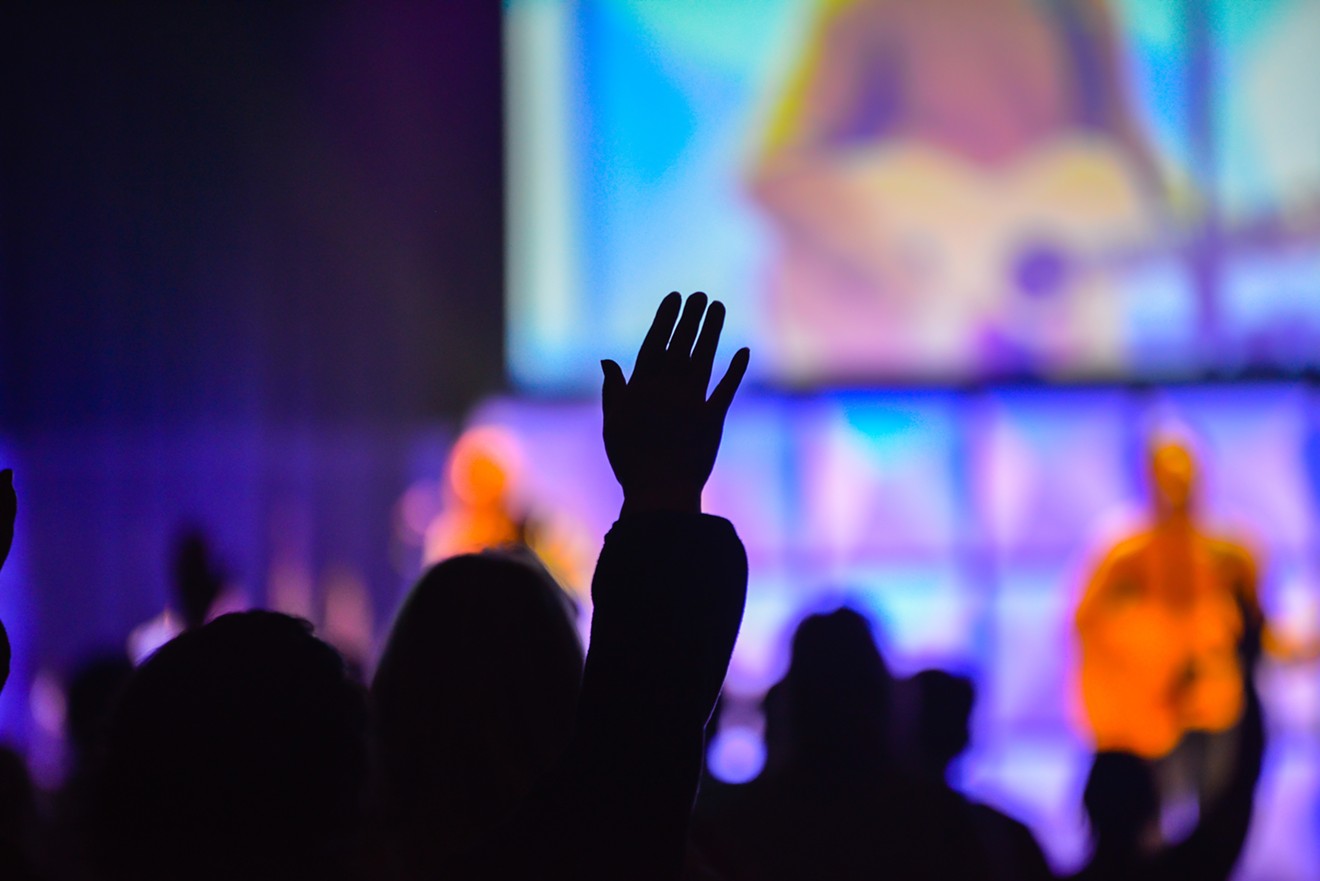Musicians take gigs from almost anywhere. Want them to play in a dirty old bar? Of course they will. Need a musician for your company's fundraising event? They will play it. What about a bassist who will show up on time to church service every Sunday morning to play songs about Jesus? If it's a steady and paying gig, they are there — even if that means driving through the night to get there.
We spoke with DFW musicians — some who were willing to go on the record and some who weren't — about how they balance life as a secular musician six days per week with two hours in a worship band Sunday mornings.
Emsy Robinson Jr.
A well-known local bassist, Emsy Robinson Jr. can be spotted playing regular gigs around town, especially in Deep Ellum with Cure for Paranoia, Colab, Goodnight Ned and Charley Crockett. He started playing church services his junior year of high school when the praise band at his school (which was affiliated with the Methodist church) was looking for a bass player. Now he plays weekly services at a Methodist church in Celina, about an hour north of Dallas.
Robinson says it’s not unusual for him to roll into church service wearing the same clothes from a gig the night before, but playing Sunday mornings typically discourages him from being “too reckless” on Saturday evenings. There are always exceptions.
"About 10 years ago, I partied with a theater group a little too long on a Saturday night. Sunday morning, I realized I was locked in a parking garage," he says. "I called the music director and explained to him that I wouldn’t make it. It was embarrassing, but he understood. I never let it happen again." AH
Brianne Sargent
Brianne Sargent, frontwoman and bassist for the Skinny Cooks, is new to playing church gigs. She started only a year ago after being recommended for a role at a Pentecostal church. It wasn’t a hard transition, though — she grew up in the faith.
“Nearly everyone on my dad's side either preaches, evangelizes or plays an instrument,” she says.
She keeps the two worlds — playing club gigs and church gigs — separate, except when alcohol makes them bleed together.
“One time, a gig I played ended up starting late, and the band was given several shots. I was way too drunk to drive home, so I ended up sleeping in my car at the venue for a power nap. Next thing I know, it's 9 a.m. I had exactly 30 minutes to get to church. Luckily, I had water and a toothbrush in the car, and I went to 7-Eleven for toothpaste and deodorant. My clothes smelled like alcohol, weed and yesterday.” AH
Quentin Moore
Quentin Moore has been playing gigs all over North Texas for the last 15 years, since he was a student at the University of North Texas. He and his backing band, the DaxTones, have a residency at the Nylo Hotel. The soul outfit also travels for shows.
Moore started playing worship services even earlier. At 13, he became the drummer for his Missionary Baptist church in Austin, and he still plays with that denomination.
“We do devotion with traditional hymns instead of praise and worship like at nondenominational churches. We’re the blues and the funk and the roots of gospel,” Moore explains.
Moore assures that he always makes it back in time for Sunday service after playing out of town.
“Once we did a gig in Atlanta on a Saturday night, but we pulled an all-nighter and drove all the way back," he says. "I drove to Mississippi, and our drummer drove from there to Dallas. His service was at 8 a.m. I actually had a musical that day and was dog tired.” AH
“I was way too drunk to drive home, so I ended up sleeping in my car at the venue for a ‘power nap.’ Next thing I know, it's 9 a.m. I had exactly 30 minutes to get to church." — Brianne Sargent
tweet this
Felix Tellez
Felix Tellez, guitarist for Friday’s Foolery, is a six-year veteran of the band, which has a Tuesday night residency at Three Links. He also plays a residency at High & Tight on Sunday nights, which, combined with his other gigs, totals four or five shows per week.
“Come Sunday, I’m beat,” Tellez says.
He’s substituted for other musicians at various church gigs for years.
“Playing church gigs is a great thing to do if you don’t want a full-time job,” he says with a laugh, explaining that they can be lucrative. There are always downsides, though.
“I have to learn new songs every week for church, but I don’t have much time during the week,” Tellez says. “Oftentimes, I’ll stay up all night before Sunday service learning new songs and then go straight to church. It’s exhausting. I try not to do that too often.” AH
Zach Balch
Zach Balch, a singer-songwriter, grew up in a small West Texas town before making the leap to city life in Dallas. After his move, his sound began to develop from acoustic folk music to bluesy alt-country. Eventually, he started Zach Balch and The Company, complete with piano, bass and drums with lead and rhythm guitar.
As Balch pursued his musical aspirations, he realized that he needed to start making more money off of what he did best: singing and playing guitar. So, like many musicians, Balch turned to playing at churches.
"I have nothing bad to say about those churches, but I do find myself at times being uncomfortable with some of their messages because I don’t really believe in those philosophies that they’re sharing, particularly when it comes to politics," he says. "I disagree very much with the politics of the religious right, and so getting plugged right into a Sunday morning where I’ve gotta sit and listen to the holy person tell people how to vote, that is the biggest downside." JV
“The church is only aware of certain aspects of my secular music life, which is by design. They know about the stuff that is more family friendly, and the other stuff I just keep to myself.” — anonymous musician
tweet this
Anonymous musician
For many secular musicians, church gigs were a matter of opportunity. One, whose name is being withheld to protect the security of their job, started out subbing for someone else.
“After playing once, I kept getting called back, and that was it after that,” they say.
They stayed because of how it paid.
“In terms of my consistent gigs, it is the best paying. Random stuff that pops up will surpass it, but it is a good consistent source of income,” they say.
One of the most significant challenges for this person has been concealing their secular life from the church. Although they are a popular musician in the DFW music community, the congregation knows next to nothing.
“The church is only aware of certain aspects of my secular music life, which is by design," they say. "They know about the stuff that is more family friendly, and the other stuff I just keep to myself.”
Even more difficult is the façade of piety they feel necessary to put up.
“I think as nonreligious persons operating in a sacred space, it's kind of our duty to respect the congregation's beliefs and not break any kind of fourth wall or something. When I'm in the building, I basically flip a switch and act religious, not only to save my income, but also to respect the people who may not even realize that I'm being paid.”
In many ways, it has pushed them even further away from faith.
“So initially I struggled with the dishonesty aspect of the whole ordeal quite a bit," they say. "Lying to the congregation, lying to my band members, lying to my boss were all very difficult for me personally because I'm a very bad liar. Now I think I'm used to it. I grew up religious, so I kind of just feel like I'm turning back on the conditioning that I initially worked to turn off.
"As for the the spiritual health aspect, I feel like it's actually put me further in my agnostic corner. Listening to the sermons every Sunday just gives me a lot of time to really think about what the pastor is saying and what I do and don't agree with about it. I pretty much always come out feeling like I don't relate to the message and that it is still equally unconvincing.” TF













